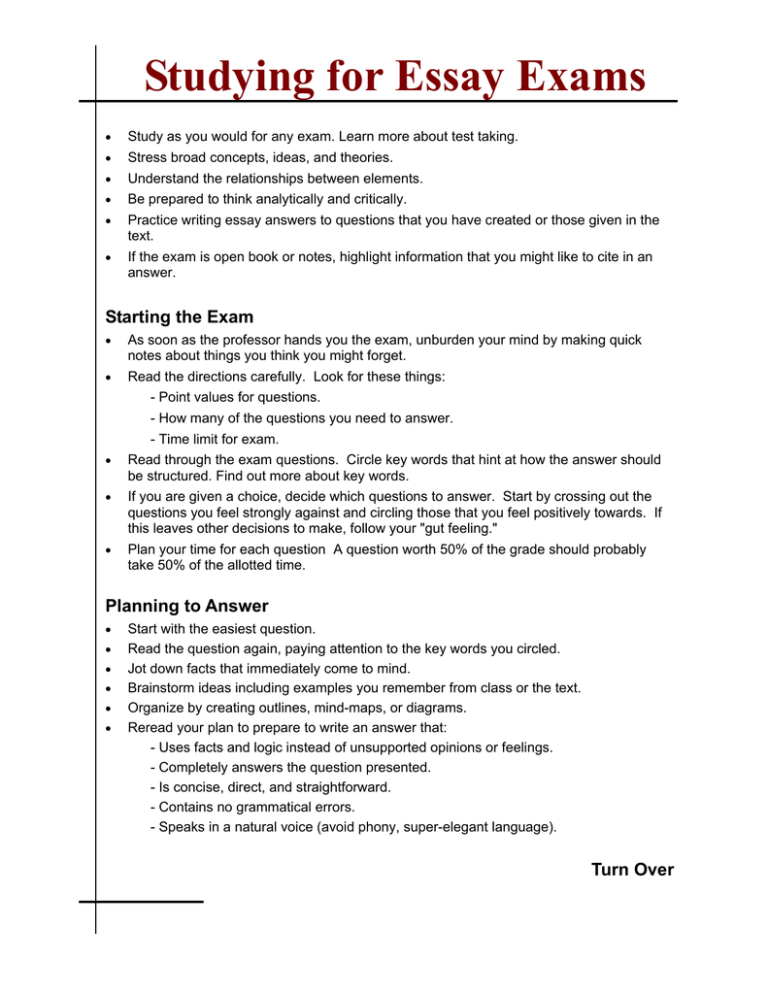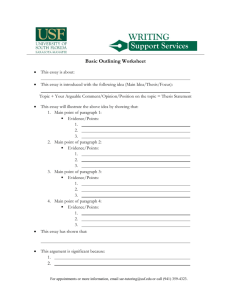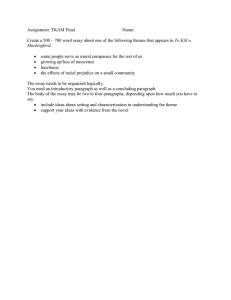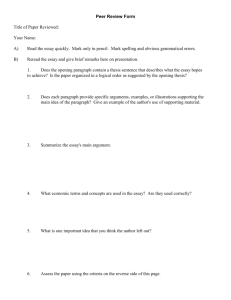Studying for Essay Exams
advertisement

Studying for Essay Exams • Study as you would for any exam. Learn more about test taking. • Stress broad concepts, ideas, and theories. • Understand the relationships between elements. • Be prepared to think analytically and critically. • Practice writing essay answers to questions that you have created or those given in the text. • If the exam is open book or notes, highlight information that you might like to cite in an answer. Starting the Exam • As soon as the professor hands you the exam, unburden your mind by making quick notes about things you think you might forget. • Read the directions carefully. Look for these things: - Point values for questions. - How many of the questions you need to answer. - Time limit for exam. • Read through the exam questions. Circle key words that hint at how the answer should be structured. Find out more about key words. • If you are given a choice, decide which questions to answer. Start by crossing out the questions you feel strongly against and circling those that you feel positively towards. If this leaves other decisions to make, follow your "gut feeling." • Plan your time for each question A question worth 50% of the grade should probably take 50% of the allotted time. Planning to Answer • • • • • • Start with the easiest question. Read the question again, paying attention to the key words you circled. Jot down facts that immediately come to mind. Brainstorm ideas including examples you remember from class or the text. Organize by creating outlines, mind-maps, or diagrams. Reread your plan to prepare to write an answer that: - Uses facts and logic instead of unsupported opinions or feelings. - Completely answers the question presented. - Is concise, direct, and straightforward. - Contains no grammatical errors. - Speaks in a natural voice (avoid phony, super-elegant language). Turn Over Studying for Essay Exams Writing the Answer • • • • • • • • • • • • • Write legibly - even if you have to print or write on every other line. Begin with a brief introduction that refers to the question and states your thesis. Do not waste time trying to compose a graceful lead paragraph as you might if you were writing an essay; get to the point quickly and directly. Keep paragraphs short - one idea to each paragraph. Begin the paragraph with the idea. Remaining sentences should support this idea. Include your best ideas early in the essay. Don't save the "best for last." Refer to specific examples from readings and lectures to support and illustrate your points. Demonstrate that you can analyze and evaluate the subject matter; do not merely state information. Use transitions to direct the reader and to make your paper clearer. Stay on the topic. The professor doesn't want to know everything you learned - just everything needed to answer this particular question. Do not ramble. Overly wordy essays may make the reader question the knowledge of the writer. End with a summary statement or two, restating your thesis and the points you made in the opening paragraph. Reread this answer before moving on to another since the thoughts are still in your mind. Reread the question. Make sure your answer fulfills the question. Finishing the Exam • • • • • Double check that you answered the correct number of questions. Make sure your answers are clearly numbered to match the questions. Proofread, checking for grammatical errors. Pay particular attention to the spelling of words. Clean up any messy looking words or smudges. Rewrite answers if needed. If you use several pages or exam booklets, be sure to number them before handing them in, for example, "1 of 3," "2 of 3," "3 of 3."




